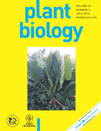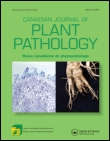
Phytopathology Research
metrics 2024
Pioneering discoveries in plant pathology and molecular biology.
Introduction
Phytopathology Research, published by SPRINGERNATURE, serves as a vital resource in the rapidly evolving fields of biochemistry, genetics, molecular biology, and plant sciences. Since adopting an open access model in 2019, this journal has fostered an inclusive approach to disseminating cutting-edge research and breakthroughs in plant pathology and related disciplines. With an impressive impact factor in the second quartile for Biochemistry, Genetics and Molecular Biology (miscellaneous) and Plant Science, and a robust standing in the Scopus rankings, it attracts high-quality contributions from researchers around the globe. The journal not only supports the academic community's quest for advanced knowledge but also plays a crucial role in addressing global agricultural challenges through innovative research. Positioned in the United Kingdom and operating with a keen focus on enhancing plant health and resistance, Phytopathology Research continues to be an essential platform for both established and emerging scientists in this vital area of study.
Metrics 2024
 0.68
0.68 3.20
3.20 3.70
3.70 13
13Metrics History
Rank 2024
Scopus
IF (Web Of Science)
JCI (Web Of Science)
Quartile History
Similar Journals

PLANTA
Transforming knowledge into groundbreaking discoveries.PLANTA, published by SPRINGER, stands as a pivotal journal in the field of plant sciences and genetics, known for its rigorous peer-reviewed research that has influenced the advancement of botanical science since its inception in 1925. With an impressive trajectory of convergence from the years 1925 to 1945, and again from 1947 to 2024, this journal maintains a strong reputation, currently categorized in the prestigious Q1 tier of Plant Science and Q2 tier in Genetics as of 2023. The journal is recognized for its high impact, ranked #64 out of 516 in Plant Science by Scopus, representing the top 87th percentile within its category, while also securing a strong position in Genetics with a #92 rank. The journal serves as a critical resource for researchers, professionals, and students who are eager to explore the complex genetics, biochemistry, and evolutionary biology of plants. Though primarily subscription-based, the quality of the research published in PLANTA makes it an essential reading for anyone serious about advancing their knowledge and understanding of plant sciences.

PLANT PROTECTION SCIENCE
Pioneering solutions for sustainable plant health.PLANT PROTECTION SCIENCE, published by the Czech Academy Agricultural Sciences, is an esteemed journal dedicated to advancing the field of agronomy, crop science, and soil science. With a strong open access policy since 2007, this journal has made significant contributions to the dissemination of research relevant to plant protection, sustainable agriculture, and environmental preservation. Operating from Prague, Czech Republic, it has successfully positioned itself within the Q2 category in Agronomy and Crop Science and Q3 in Soil Science as of 2023, highlighting its relevance and influence in these vital areas of agricultural research. According to Scopus, its rankings reflect a respectable standing, with percentile ranks of 58th in Agronomy and Crop Science and 53rd in Soil Science. Researchers, professionals, and students are encouraged to explore its rich repository of peer-reviewed articles, which aim to address critical challenges in plant health and production, thereby fostering innovation in agricultural practices.

JOURNAL OF GENERAL PLANT PATHOLOGY
Elevating Standards in Agronomy and Plant ScienceJOURNAL OF GENERAL PLANT PATHOLOGY, published by SPRINGER JAPAN KK, is a pivotal platform dedicated to the dissemination of high-quality research in the fields of agronomy and crop science, as well as plant pathology. With an ISSN of 1345-2630 and an E-ISSN of 1610-739X, this journal plays a significant role in advancing our understanding of plant diseases and their management, particularly within the context of sustainable agriculture. Currently ranking in the Q3 quartile for both Agronomy and Crop Science as well as Plant Science, it showcases a diverse array of articles that encompass fundamental research, innovative methodologies, and practical applications to address contemporary challenges in these fields. Researchers and professionals seeking to enhance their knowledge and stay abreast of the latest findings will find the JOURNAL OF GENERAL PLANT PATHOLOGY an invaluable resource. Operating without Open Access, it still ensures wide accessibility through institutional subscriptions and comprehensive digital archiving, with a commitment to excellence from its inception in 2001 through its ongoing developments into 2024.

Current Plant Biology
Driving Progress in Plant Science ResearchCurrent Plant Biology is a distinguished peer-reviewed journal published by ELSEVIER, focusing on the dynamic and rapidly evolving field of plant sciences. Since its inception as an Open Access publication in 2014, it has established itself as a leading platform for innovative research, boasting a remarkable Impact Factor that underscores its relevance and contribution to the scientific community. Based in the Netherlands, this journal caters to a diverse audience of researchers, professionals, and students, facilitating the dissemination of key findings in an array of disciplines including biochemistry, genetics, cell biology, and developmental biology. Recognized for its rigorous standards, Current Plant Biology holds a prestigious standing, classified within the Q1 and Q2 quartiles of various Scopus categories, reflecting its impact and reputation in the realms of Plant Science and related fields. The journal is committed to providing accessible and high-quality research outputs that inspire further investigation and collaboration in plant biology.

aBIOTECH
Connecting scientists to shape the future of biotechnological applications.aBIOTECH, published by SPRINGERNATURE, is a premier academic journal dedicated to advancing the fields of biotechnology, agronomy, and molecular biology. With an impressive ISSN of 2096-6326 and E-ISSN 2662-1738, this journal has established itself as a vital resource for researchers and professionals aiming to publish high-quality, impactful studies. Based in Singapore, aBIOTECH has achieved remarkable recognition, boasting a Q1 ranking in multiple categories including Agronomy and Crop Science, Biochemistry, and Genetics in the 2023 Scopus rankings. Its solid position in the 90th percentile for Biochemistry and Genetics reinforces its significance within the global scientific community. The journal covers a broad spectrum of topics relevant to both basic and applied research, facilitating a shared dialogue amongst scientists and encouraging collaborative progress in innovative biotechnological applications. The open-access nature of the journal ensures that cutting-edge research is freely available, fostering a global exchange of ideas that is critical to the advancement of science today.

PLANT BIOLOGY
Unveiling the Secrets of Plant EcologyPLANT BIOLOGY is a prestigious academic journal published by Wiley, dedicated to advancing knowledge in the fields of plant science, ecology, and evolutionary biology. With an impressive impact factor and ranking in the Q1 category for Ecology, Evolution, Behavior and Systematics, and Plant Science as of 2023, it stands at the forefront of research dissemination. The journal encompasses a broad scope of plant biology topics, providing a critical platform for researchers to share innovative findings and foster interdisciplinary collaboration. Available in both print (ISSN: 1435-8603) and online formats (E-ISSN: 1438-8677), it ensures accessibility through open access options. As a crucial resource for professionals, researchers, and students alike, PLANT BIOLOGY cultivates a deeper understanding of plant systems and their ecological significance, making it an essential addition to the library of anyone dedicated to the study of biology and the environment.

CANADIAN JOURNAL OF PLANT PATHOLOGY
Exploring the vital connections between plants and their environment.Canadian Journal of Plant Pathology, published by Taylor & Francis Inc, is a leading academic journal dedicated to advancing the field of plant pathology, with a significant focus on the interplay between plant health and environmental factors. Established in 1979, this journal has established a reputation for high-quality research, currently holding a commendable impact factor within its category. As of 2023, it ranks in the Q2 quartile for both Agronomy and Crop Science as well as Plant Science, highlighting its importance and influence in these domains. With an impressive ranking of 142/516 in Plant Science and 115/406 in Agronomy and Crop Science according to Scopus, the journal is positioned within the 72nd and 71st percentiles, respectively. The Canadian Journal of Plant Pathology serves as a vital platform for researchers, professionals, and students aiming to contribute to the understanding of plant diseases, fostering innovation and development in agricultural practices.

AUSTRALASIAN PLANT PATHOLOGY
Unraveling the complexities of plant diseases across the region.Australasian Plant Pathology, published by Springer, is a leading journal in the field of plant science that focuses on the study of plant diseases and their management across the Australasian region. With an established history since 1978, the journal aims to provide a platform for high-quality research that enhances our understanding of plant pathology, prevention strategies, and sustainable management practices. With an impact factor that reflects its significance in the scientific community and its Q3 quartile ranking in 2023 among plant science journals, it serves as a vital resource for researchers, professionals, and students alike. Although it does not have Open Access options, the journal ensures that its content, which spans a wide spectrum of plant pathology topics, remains accessible to a diverse audience globally. With a commitment to advancing knowledge in this crucial area of study, Australasian Plant Pathology continues to play an essential role in addressing the challenges posed by plant diseases in a changing environment.

PHYTOPATHOLOGY
Cultivating excellence in agricultural science.PHYTOPATHOLOGY, published by the American Phytopathological Society, is a premier journal dedicated to advancing the science of plant pathology. With an ISSN of 0031-949X and E-ISSN 1943-7684, this journal has been a cornerstone of scholarly communication in the field since its inception in 1946. Ranked in the top quartile (Q1) in both Agronomy and Crop Science and Plant Science for 2023, PHYTOPATHOLOGY has garnered notable recognition with Scopus ranks placing it at #86/516 (83rd percentile) in Plant Science and #69/406 (83rd percentile) in Agronomy and Crop Science. The journal publishes high-quality research articles, reviews, and case studies that explore innovative solutions to plant diseases, thereby supporting agricultural productivity and sustainability. While currently not an open-access journal, it offers vital insights and findings that are invaluable to researchers, professionals, and students aiming to advance their knowledge and contribute to the field of plant sciences.

Annual Review of Phytopathology
Exploring the forefront of phytopathological research.Annual Review of Phytopathology, published by ANNUAL REVIEWS, is an esteemed journal that has been at the forefront of the field since its inception in 1973. With a focus on both Plant Science and Medicine, the journal holds a prestigious Q1 ranking in both categories for 2023, reflecting its influence and significance in the academic community. The journal features comprehensive review articles that encapsulate significant advancements and emerging trends in phytopathology, providing valuable insights for researchers, professionals, and students alike. Its rigorous peer-review process ensures the highest quality of publication, making it essential for anyone seeking to stay informed on critical issues affecting plant health and related disciplines. With an impressive Scopus ranking of #10 out of 516 in Agricultural and Biological Sciences, Annual Review of Phytopathology remains a vital resource for the dissemination of cutting-edge knowledge, fostering innovation and collaboration within the field.